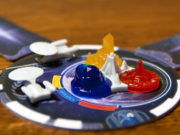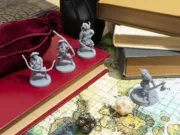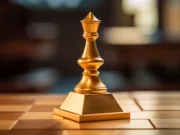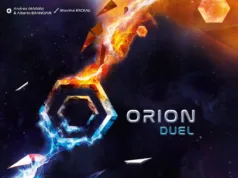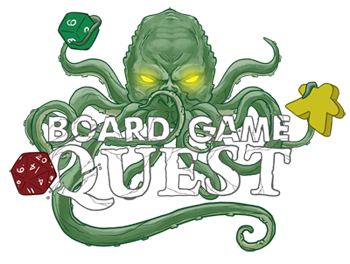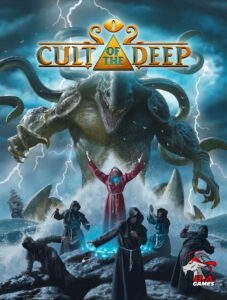 I typically look to review games that interest me and I am aware of, but occasionally some good ones come out of the blue. A great example of this is when I was walking through the exhibit hall at Gen Con last year when someone called out, “Hey BGQ!”. They waved me over to their booth and that’s where I met Sam Stockton from B.A. Games. We chatted for a few minutes before he asked if I was interested in reviewing their new game called Cult of the Deep. This game was not on my radar but it sounded macabre which is right up my alley. A group of BGQ staff went back to the B.A. Games booth the next day, and Ed Stockton walked us through the rules and we demoed a full game.
I typically look to review games that interest me and I am aware of, but occasionally some good ones come out of the blue. A great example of this is when I was walking through the exhibit hall at Gen Con last year when someone called out, “Hey BGQ!”. They waved me over to their booth and that’s where I met Sam Stockton from B.A. Games. We chatted for a few minutes before he asked if I was interested in reviewing their new game called Cult of the Deep. This game was not on my radar but it sounded macabre which is right up my alley. A group of BGQ staff went back to the B.A. Games booth the next day, and Ed Stockton walked us through the rules and we demoed a full game.
This brings us to today’s review of Cult of the Deep from B.A. Games. This hidden role, dice roller is where players are members of different cult factions who are fighting each other while trying to gain power and control of the cult (or its destruction). Cult of the Deep is for 4-8 players and plays in about an hour or so.
Game Overview:
The Cult of the Deep set-up will vary by the player count and will determine how many different hidden Roles and Altar boards will be used. Each player will be secretly dealt one of the four roles: High Priest, Faithful, Cabalist, and Heretic. Each has unique victory conditions. The only role that will be revealed is the High Priest. Each player is also dealt a Character card (revealed) and Sigil card that is kept secret.
The game then begins with the player who revealed the High Priest and each player’s turn includes the following 4 phases:
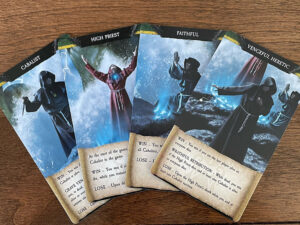
1. Roll: players will roll the 5 Cultist Dice and have the chance to re-roll any number of dice or keep but players must keep the second result. The dice include unique symbols for losing and gaining life and for ritual advancement.
2. Commit: the active player will commit the Cultist Dice they rolled to other players (to gain or lose life), to their cultist to gain life, or to altars to gain the rituals benefit.
3. Response: this is where all other players aside from the active player have the option to use abilities and ritual benefits to change the result of committed dice. If players have passed or responded, then the active player has can re-commit changed dice to another player or ritual.
4. Resolve: active player now resolves their committed dice results noted in phase 2.
When all the tracks on the Altar board track reach 0 a Ritual is completed and if it has a Keeper effect the player to complete may keep it and gain a power and if the Ritual doesn’t it’s discarded and a new Ritual is drawn.
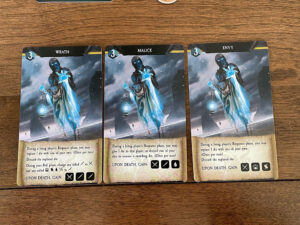
If a player loses all their life, they die, and reveal their Role card. Players keep their Sigil card and tokens they might have gathered from Rituals but they lose the cards they collected. That player then draws from the Wraith deck. The Wraith card will tell the player how many Wraith dice and what power they gain. Wraith players will still have 4 phases to their turn but are different than living players.
The game ends immediately at the end of a player’s turn if any of the following victory conditions are met for a given role. The High Priest will win if all Cabalist and Heretics are dead. The Faithful will win if everyone is dead but the High Priest. The Cabalist will win if the High Priest dies and at least one Cabalist is alive. The Heretic will win if all other players are dead including him/herself.
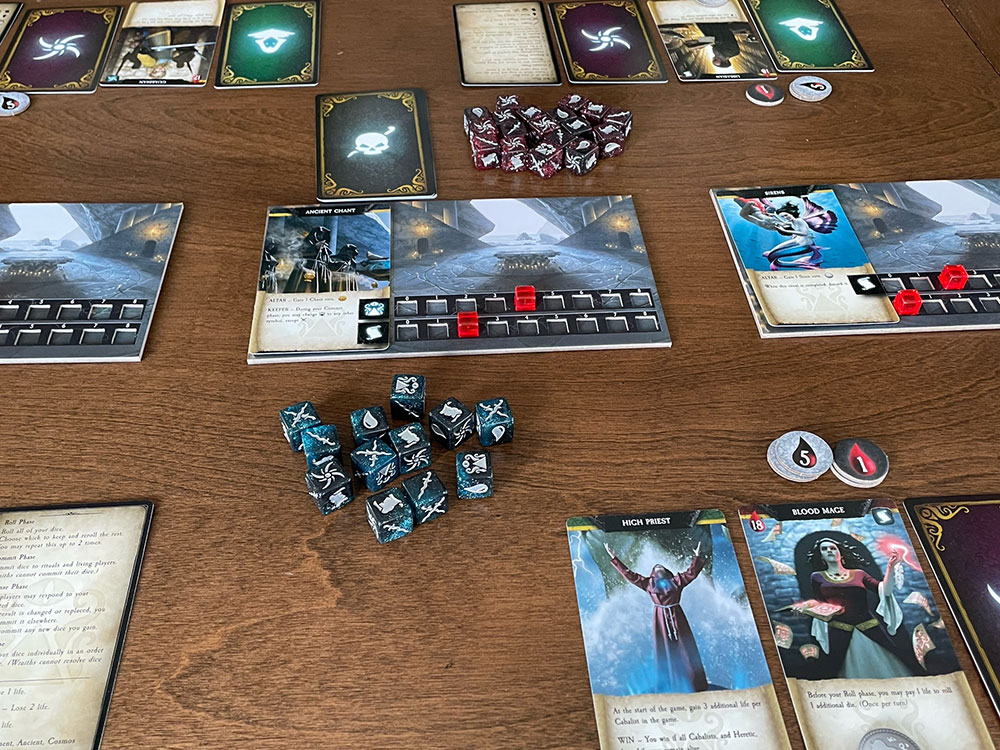
Game Experience:
I must admit I‘ve really enjoyed Cult of the Deep from my first play to my last. It’s easy to pick up and teach and the rules are very straightforward which keeps the game moving and players engaged. The most challenging thing for most players to pick up is when they die and become a Wraith. The mechanics are different enough that it usually takes a turn or two for most players to become comfortable with this new role. Aside from that, the game mechanics are solid and allow you to get Cult of the Deep to the table fast.
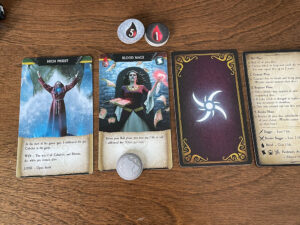
The next thing I want to highlight is some good and bad news. Let’s start with the bad news, Cult of the Deep is light on the hidden player aspect. Most players, especially any that have played the game multiple times, can pretty much tell who is playing what role after 2 or 3 turns. The High Priest is, of course, revealed so no mystery there but it doesn’t take much to figure out who is the Faithful, Cabalist, and maybe even the Heretic based on how players are committing their dice each turn. So, if you were expecting One Night Ultimate Werewolf or The Resistance, then Cult of the Deep might not be the game for you.
Now for the good news, Cult of the Deep being light on the hidden player doesn’t hurt the gameplay at all. It’s still a blast even after you’ve guessed who is the Faithful, Cabalist, and Heretic. Actually, I think it adds to the fun as players will likely continue to deny their role all the while that you know but doubt might creep in every now and again. Plus, you don’t need the “right” players to motivate to play Cult of the Deep because if they mistakenly or purposely reveal their role that’s not a winning condition that lessens the game or brings other players an automatic victory.
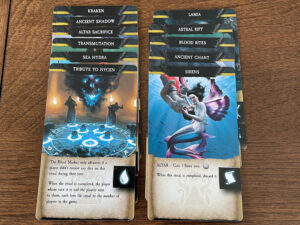
I have to say that the best part of Cult of the Deep for me is that it’s a social game. You’re constantly chatting about who you may or may not trust and trying to convince other players not to commit dagger dice (lose a life) to you or trying to bargain to get blood dice (gain life). All players are interacting and trying to sell players on what your role isn’t (unless you’re in the same role) and the banter keeps all players engaged and having a blast. Overall the social aspect of Cult of the Deep makes it pretty much a memorable experience most of the time the game hits the table.
The last positive I want to highlight is the Wraith role. Yes, it’s not as interactive as the roles you start with but it solves the player elimination flaw that some games have of removing players from a game. The Wraith is more of a support role for allies and hinders your enemies but nonetheless, it keeps players in the game engaged especially since even in death a Wraith player can still meet victory conditions and win if they are met.
The only other thing holding back Cult of the Deep from scoring higher was that the Ritual deck which could be deeper. Now, I don’t mind becoming familiar with the 11 Rituals that come with the game which are all unique but more Ritual cards would add variety to the game because after 3-4 plays you will likely run through the deck and deeper decks help replay value in my opinion. It will also help not to have to shuffle the Ritual deck when you’re playing the 7-8 player game. There are some Rituals you really only ever want to see once (or not at all).
Final Thoughts:
I love the macabre and Cult of the Deep lets me play a Cultist, yes, a bad guy in this easy to learn fast to the table dice roller. Cult of the Deep is light on the hidden role mechanic but it will not ruin a player’s experience or give any player an automatic when if a player’s role is revealed.
Cult of the Deep is an excellent social game that keeps players engaged and keeps players in the game even after they die by allowing players to become a Wraith and stay in the fun. Now, could the Ritual deck be deeper, of course, and by adding more cards this would help increase the overall replay value and variety for this game.
Final Score: 4 Stars – A social and memorable dice roller that might be light on the hidden role but is heavy on fun and player engagement.
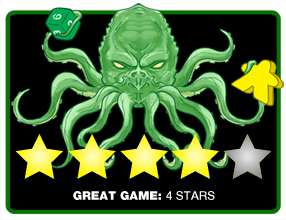 Hits:
Hits:
• Fast to the table and learn
• Discovering roles doesn’t hurt gameplay
• Great social interaction
• Wraith
Misses:
• Light on hidden role
• Deeper ritual deck




